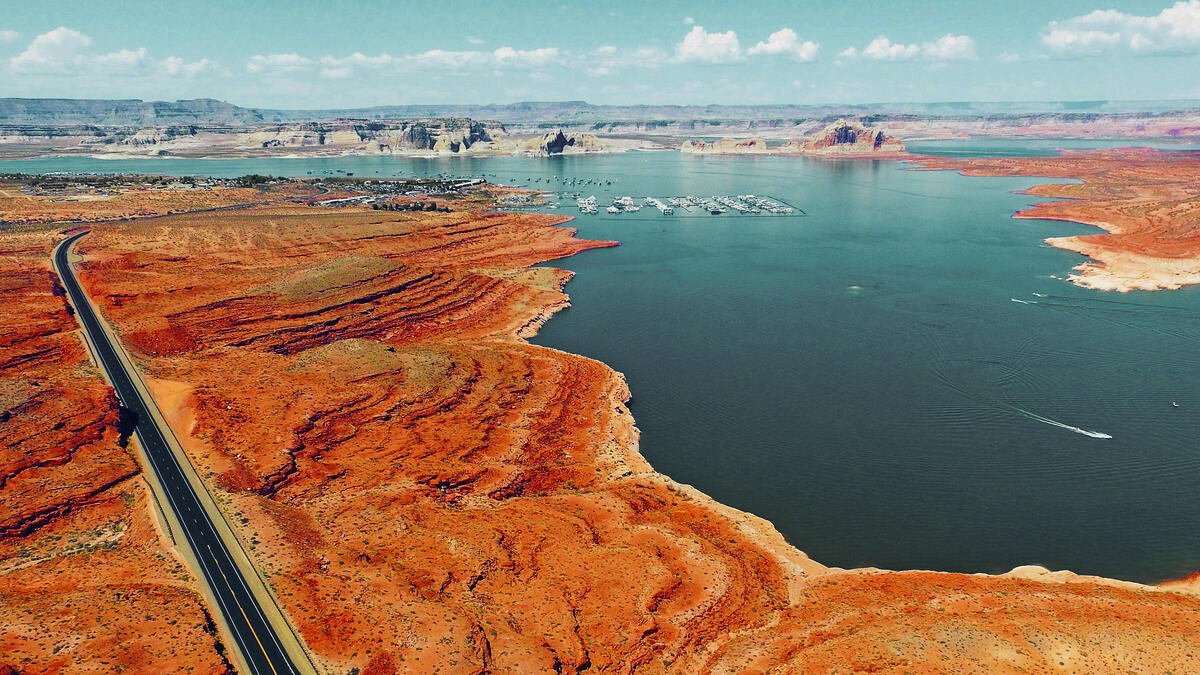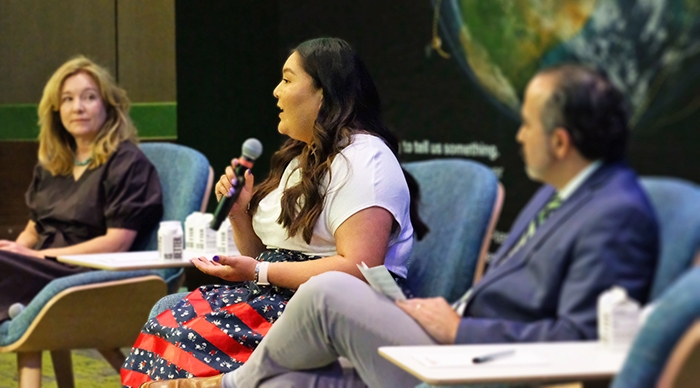ASU research fellow addressing tribal water policy in Arizona

Gaps in water policies have historically left tribal communities with limited access to clean water and infrastructure — a situation that Cora Tso is working to correct.
Water is a crucial topic in the American Southwest, as continued drought and cuts to Colorado River water allocations make more urgent the policy decisions on the future of water in the region.
Gaps in water policies have historically left tribal communities with limited access to clean water and infrastructure, a situation that Cora Tso is working to correct.
Tso, a new senior research fellow with the Kyl Center for Water Policy at Arizona State University’s Morrison Institute, is particularly well-suited to address tribal water policy issues as both a lawyer specializing in Indian and water law and an enrolled member of the Navajo Nation. She aims to share her expertise with others, both through an assessment tool she is creating and an upcoming free webinar on tribal water issues April 9 that is open to the public.
The Kyl Center is one of the pillars of the Arizona Water Innovation Initiative, a multiyear partnership with the state led by Arizona State University’s Julie Ann Wrigley Global Futures Laboratory in collaboration with the Ira A. Fulton Schools of Engineering to help ensure a regional thriving future with a secure water supply.
Webinar
Arizona Tribal Water Rights: How Did We Get Here?
11 a.m. April 9
Register
The work aligns with Tso’s background and research interests.
“My reverence for water definitely stems from growing up in a traditional Navajo home and understanding the importance of water in our daily lives and who we are as people,” she says. “Taking care of the land and water are cultural values that I was born and raised with that help guide me in life.”
Tso was brought up in the small community of Shonto on the Navajo Nation in northeastern Arizona, where her family still lives. Shonto sits on the edge of the Black Mesa area, not far from the Peabody coal mine.
“The train that transported coal to the former Navajo Generating Station (NGS) went right across the area where my family lives,” Tso says, adding that it played a big role in her early learnings about the tensions between resource extraction and water use on tribal lands.
“We drove by the NGS every day on my way to school in Page, off the reservation, and I didn't really understand the nuances of that development until learning Navajo government history in high school. It also really struck me that the NGS was so close to one of our country's largest freshwater reservoirs, Lake Powell, and to the Colorado River. I knew by the age of 14 that I wanted to work to address inequitable resource extraction on tribal lands.”
That early observation led Tso to pursue an undergraduate degree in political science with a minor in American Indian studies from ASU, where she was also a student in Barrett, The Honors College. She then went on to receive a Juris Doctor with an Indian law certificate from ASU’s Sandra Day O’Connor College of Law.
“Knowing tribal communities who have been the first caretakers of this land did not have basic needs met, like secure clean water access and water infrastructure, really troubled me,” she says. “Once I understood that history, it seemed like my path was set.”
Tso is now working with Arizona tribes, as well as with state and federal agencies and other key communities, including ASU’s tribal partnership program, to develop collaborative water solutions and policy recommendations.
“What brought me to (the Arizona Water Innovation Initiative) and the Kyl Center was the understanding that there’s so much need for partnership,” Tso says. “At the same time, I recognize each tribe has a different cultural perspective on water, and of course different views about how they want to use their water. Respecting those differences is of paramount importance for me in working toward equitable partnerships.”
Tso also notes that while each tribe is sovereign, there are also myriad reasons to work collectively.
“We always hear about tribal water settlements and how they're unique to each tribe, but understanding those settlements are coming from the Arizona allocation of the Colorado River ties us together, regardless of varied perspectives on past laws and policies,” she says.
Additionally, Tso is working to identify key policy gaps and challenges that affect tribal water access, as well as documenting the current water usage, rights and allocation policies and laws among tribal nations across Arizona.
“Identifying spaces where we could potentially build research or policy recommendations or find ways to build capacity within tribal communities, whether that’s creating programs for tribal members to learn about water law or policy or building those deeper state and tribal connections, could be so powerful.”
Tso is developing a publication assessing tribal water rights settlements in Arizona. She hopes that people will be able to use it as a learning resource as well as a guide of sorts for tribal governments that might be in the process of securing their water rights.
“I want to provide a systematic review of where the 22 Arizona tribes are with their water settlements,” says Tso. “Some might still be in litigation or negotiation, but just being able to look at the 14 tribes who have fully or partially resolved their water rights and outline the advantages and limitations of their settlements would be very helpful. I’d love to highlight the positive impact tribal water settlements have had on Arizona water policy.”
Tso was recently recognized as a Colorado River Water Leader by the Water Education Foundation and has strong ambitions as she continues in her career.
“People who understand Arizona’s water history know how much tribes have helped the state, while also being deprived of water access,” she says.
“It’s important to me to be in a space where we can present the history and current impact that tribes have on Arizona water policy and tell the story from our perspective. Over the long term, I would like to have played a big part in changing the narrative related to tribal water rights.”
Want more water news?
For more water news from the Arizona Water Innovation Initiative, sign up for the mailing list to receive quarterly newsletter and monthly blog roundups.
More Environment and sustainability

From environmental storytelling to hydroponics, student cohort crafts solutions for a better future
A select group of students from Arizona State University's College of Global Futures, a unit within the Julie Ann Wrigley Global Futures Laboratory, is laying the foundation to drive change…

2 ASU faculty elected as AAAS Fellows
Two outstanding Arizona State University faculty spanning the physical sciences, psychological sciences and science policy have been named Fellows of the American Association for the Advancement of…

Homes for songbirds: Protecting Lucy’s warblers in the urban desert
Each spring, tiny Lucy’s warblers, with their soft gray plumage and rusty crown, return to the Arizona desert, flitting through the mesquite branches in search of safe places to nest.But as urban…


